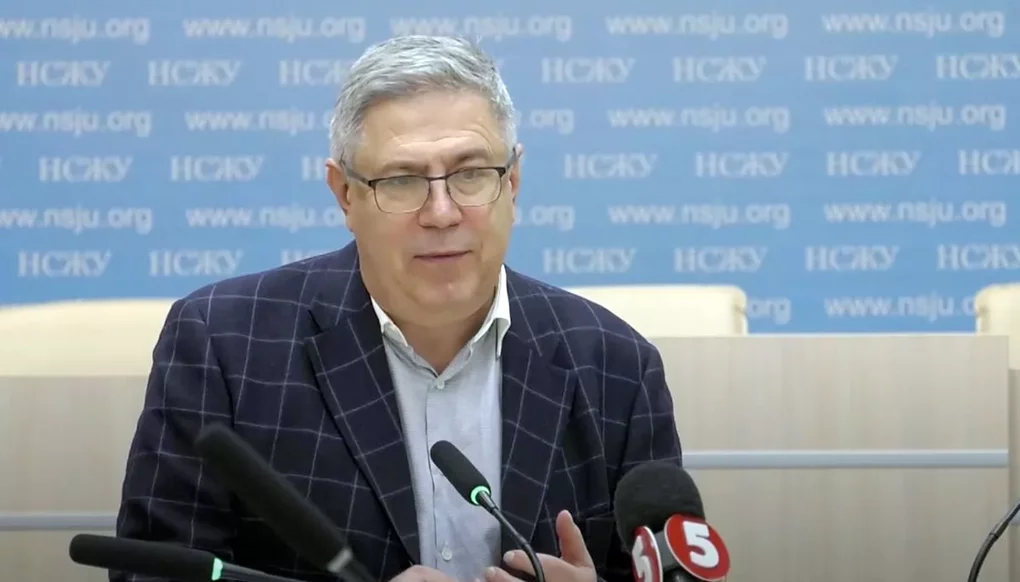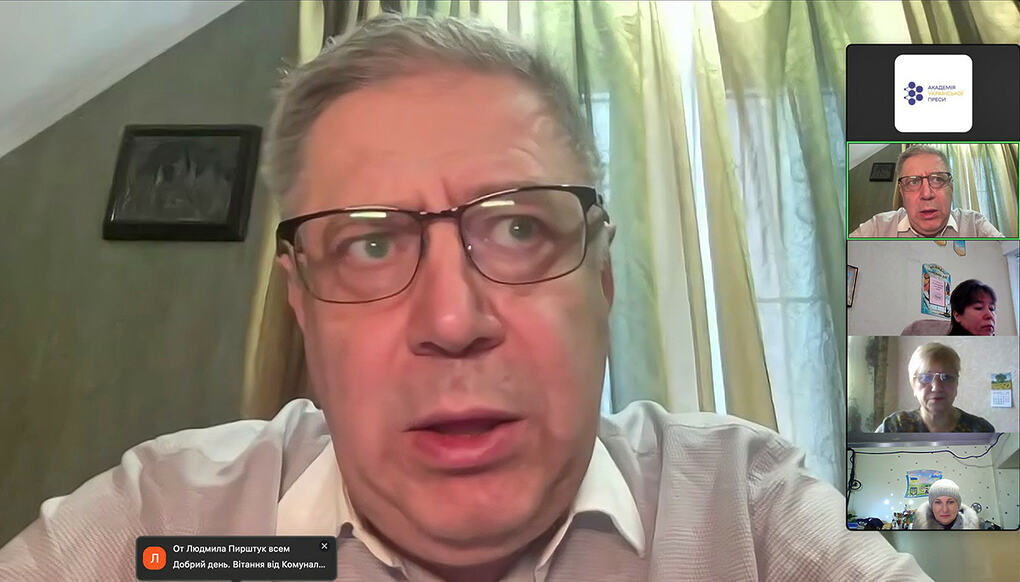
On 29 January, the Academy of Ukrainian Press, together with the Ministry of Education and Science of Ukraine, held an interregional forum «Development of Media Education in Ukraine: Regional Dimension». The online event was attended by 850 educators, librarians and managers from Donetsk, Luhansk, Zaporizhzhia, Dnipro and Kharkiv regions. «Detector Media» asked Valeriy Ivanov, President of the AUP, about the results of the forum, the level of media education in the regions of Ukraine, and the prospects for its further development, in particular after the termination of US support for many media literacy projects.
- Mr Valeriy, this is not the first time the Academy of Ukrainian Press has held such a forum in cooperation with the Ministry of Education and Science. How did you manage to attract so many educators, especially for an online event?
- Yes, this is our fifth forum. We have been working since 2010 and were the first NGO in Ukraine to start working on media literacy. By the way, in cooperation with Detector Media. We have also been working with the Ministry of Education and Science since 2010.
We decided that in such difficult conditions, when the war has become a given, people could get used to it and pay less attention to propaganda and distortion of information by the enemy. And to prevent this from happening, we decided to mobilise our assets: teachers and activists from the regions. At first, we were going to meet offline, then due to the situation, we had to switch to online mode. Our latest forum is dedicated to the east, but we will also gather the north of Ukraine. Our task is to mobilise educators to counteract the enemy's lies, propaganda and manipulations, so that they can do the same for their students and their parents.
- Are you currently focusing on those regions that suffer the most not only from information but also from missile attacks?
- We also visited the south, gathering educators from Odesa, Mykolaiv, and Kherson regions. I wouldn't say that only in these regions, we work everywhere, because there is no city in Ukraine that is safe from Russian attacks. And there is no city that is safe from Russian propaganda.
This time, the forum gathered 850 participants. Yes, this is a good number, but we are used to such figures. If we hold any online events, they usually get several thousand views. So there are still a lot of educators in Ukraine. They are used to us, and we are used to them, so we gather large audiences.
- I think it's a great opportunity for educators from different regions to share their experiences and best practices. What do teachers themselves say about the problems and challenges they face?
- They face different challenges in different regions. If we are talking about Kharkiv or Sumy regions, the challenges here are to physically protect children. Many cities and towns are undergoing forced evacuation. I was there with my colleagues last week to support frontline newspapers.
In other cities, in the west or in the centre of Ukraine, this issue is not as acute, but there is a task to protect children from the effects of enemy propaganda. In other words, this task is shared by the whole of Ukraine. One of our goals is to create a kind of networking so that educators know each other and can share teaching experience, methods and tools.
Since 2015, we have been training journalists and conducting trainings in tactical medicine and physical security. But we don't do this for teachers, we conduct training on mental safety. That is, how to protect themselves, their students and their parents from the effects of enemy propaganda.

Online forum «Development of media education in Ukraine: regional dimension»
- Many media literacy projects in Ukraine have been funded by American donors. How do you think the suspension of this support will affect the development of media education?
- Of course, this is very unfortunate. We are used to working in partnership with our American colleagues. But I wouldn't say it's fatal. We continue to do a lot of work on a volunteer basis. And, frankly, we have always done a lot of work on a volunteer basis, including during the Covid: we held online bridges, international large forums on media literacy, conferences.
Why is it unfortunate? Because it limits the scope of the work. With appropriate funding, this scale would be larger. In addition, there is a category of publications that desperately need additional funding. I mean frontline newspapers. That's why I'm highlighting this particular segment. I just know them, I have been to many of them personally, I know their employees. These people work with enthusiasm, but they also need some money to somehow feed themselves and their editorial staff. To somehow ensure distribution and delivery. It's not a lot of money, but they need it.
In many frontline towns and villages, people have no connection, no access to the internet, and in fact, they have only two sources of information: the newspaper, which is delivered to them, as a rule, once a week, and rumours.
I saw people in Velyka Pysarivka (Sumy region) gathering outside a shop and waiting for the newspaper to arrive. If we leave everything to rumours, we will lose people. We are already losing people, and I mean not only physically but also ideologically.
Of course, the state has no money for this now. The state sends everything to the frontline. And this is where donor funds are very much needed. I hope that this is in the interests of the US and that this funding will be resumed. In the meantime, we will work on a volunteer basis.
- A sociological study by the Academy of Ukrainian Press and Socioinform showed that media literacy is being introduced more actively in cities than in rural communities. Obviously, the situation in some villages is difficult because of the war. But if we take into account the relatively peaceful regions, what is the reason for this gap? Is there still a problem with technical support?
- There are objective reasons for this. If it's a big city, it's easier for people to get together, to come to a seminar, to join other people. Our villages are not as poorly equipped as in other post-Soviet states. We, the Academy of Ukrainian Press, have helped to get media literacy on its feet in other post-Soviet countries, so I know the situation there. In villages there, the situation is technically worse than here. In our country, they are mostly computerised and have the Internet, of course, except for those where the war has disrupted everything.
According to our survey, the level of media literacy in villages is lower than in cities, but it is still at a more or less decent level. The main thing is that we don't really have any gaps where people don't know what media literacy is, what critical thinking is, and teachers are not focused on it at all. I am very pleased that even in science and physical education classes, and even now there will be a new discipline called «Defence of the Motherland», there are already elements of media literacy. We propose to integrate elements of media literacy even in the visual arts classes. In other words, media literacy is really in the first place among post-Soviet countries.
- Can media literacy be a separate subject?
- I am sceptical about this, because it is already a very heavy workload. And for me, the experience of our Western colleagues is crucial here. After all, we have chosen the Western vector of development of our nation, so we will follow their example in this regard. There, this subject is integrated into various subjects, from language and history to physical education. We are following this path. Media literacy is taught separately in Ukraine, but as an optional subject in about 15% of schools.
- In addition to holding regional forums, how do you see further cooperation with the Ministry of Education and Science?
- Our cooperation with the Ministry of Education and Science is ongoing, and we have met with virtually all ministers. We recently met with the current Minister, and he clearly understands the need to develop media literacy. We signed a memorandum of cooperation and the main directions of media literacy development. That is, without the Ministry of Education and Science, we would have been able to do much less. But in Ukraine, we have a real system of training and instilling critical thinking skills among pupils and students. We have a system that really works. This is thanks to the cooperation with the Ministry of Education and Science.
- Does the AUP have any methodological materials for educators, including those who did not participate in the forums?
- We have a unique library on media literacy on our website in the «Our Publications» section. There are specific methods with examples, plans for holding seminars, trainings on media literacy for activists, and how to conduct media literacy lessons. Different types of lessons, different subjects. Different groups of classes. And how to conduct classes among students, also of different specialities. We keep adding to this library, it's really unique. And it is widely visited. Why I'm not surprised by the high attendance at the forums is because we have very active teachers. And now we continue to publish the best lessons on media literacy through our channels. A month or so ago, we finished another competition in this regard.
We have collection books and lesson plans. Just take it and do it. We don't actually have any theoretical developments there, we have real practical developments and there are many, many of them.